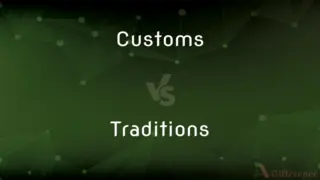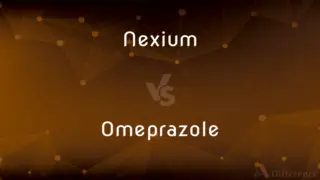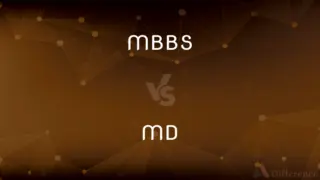Immortal vs. Eternal — What's the Difference?
By Tayyaba Rehman & Maham Liaqat — Updated on April 4, 2024
Immortal implies not subject to death or aging, often applied to beings, while eternal suggests a timeless, unending existence, applicable to concepts or entities beyond temporal limits.

Difference Between Immortal and Eternal
Table of Contents
ADVERTISEMENT
Key Differences
Immortality is a trait attributed to beings that do not age or die, emphasizing resistance to the processes of aging. It is often discussed in the context of myths, legends, and speculative fiction, highlighting beings that live indefinitely. On the other hand, eternity encompasses an existence that transcends time itself, applicable not only to beings but also to ideas, states, or objects that are perceived as having no beginning or end.
While immortality focuses on the aspect of life, suggesting a continuation of existence without the natural conclusion of death, eternity extends the concept to all facets of existence, suggesting a state or condition that is beyond the measurement of time. Immortality is about the quality of life that defies the typical lifecycle, whereas eternity denotes a timeless, unchanging state.
The concept of immortality often brings with it questions of quality of life, ethical implications, and the natural cycle of life and death. It invites discussions on the desire for life without end and the consequences thereof. Eternal existence, on the other hand, raises philosophical inquiries about the nature of time, the universe, and the concept of infinity, suggesting a permanence that goes beyond individual existence.
Immortality can be seen as a subset of eternity, in the sense that beings who are immortal are living through time without end, but they may not be eternal if their existence had a beginning. Eternal entities or concepts, however, are considered to have neither beginning nor end, existing outside the bounds of time as we understand it.
Finally, in literature and mythology, immortality is often depicted as a blessing or a curse, with stories exploring the ramifications of living forever. Eternity, however, is more abstract and is often associated with divine or cosmic principles, representing an ultimate, unchangeable state of being or truth.
ADVERTISEMENT
Comparison Chart
Definition
Not subject to death or aging.
Existing beyond the confines of time, without beginning or end.
Application
Primarily to beings.
To concepts, states, entities, and beings.
Key Focus
Continuation of life.
Timelessness.
Philosophical Questions
Ethical implications of endless life.
Nature of time and existence.
Examples in Mythology
Gods, vampires, and other mythical creatures.
Concepts of heaven, hell, and the universe.
Compare with Definitions
Immortal
Existing forever in stories or legends.
Heroes of old, though not alive, remain immortal in our tales.
Eternal
Timeless or unchanging.
The eternal beauty of the stars inspires countless generations.
Immortal
Not subject to death.
In many myths, gods are depicted as immortal beings.
Eternal
Lasting or existing forever.
The universe is often considered eternal in its expanse.
Immortal
Living indefinitely, not aging.
The quest for an immortal life has fascinated humans for centuries.
Eternal
Infinite duration.
Philosophers ponder the concept of eternal time.
Immortal
Resistant to the passage of time.
Some believe the soul to be immortal.
Eternal
Without beginning or end.
The idea of eternal love is a common theme in literature.
Immortal
Capable of endless regeneration.
The immortal jellyfish can revert to its juvenile form.
Eternal
Beyond the limits of time.
Some concepts of the divine describe it as eternal.
Immortal
Never to be forgotten; everlasting
Immortal words.
Eternal
Eternal God. Used with the.
Immortal
Of or relating to immortality.
Eternal
(philosophy) existing outside time; as opposed to sempiternal, existing within time but everlastingly
Immortal
(Biology) Capable of indefinite growth or division. Used of cells in culture.
Eternal
Without end of existence or duration; everlasting; endless; immortal.
That they may also obtain the salvation which is in Christ Jesus, with eternal glory.
Immortal
One whose fame is enduring.
Eternal
Being without beginning or end
Belief in an eternal creator.
Immortal
Never to be forgotten; that merits being always remembered.
His immortal words
Eternal
Continuing without interruption; perpetual
Earned my eternal gratitude.
Immortal
Connected with or relating to immortality.
Eternal
Seemingly endless; interminable
Eternal waiting at the airport.
Immortal
(obsolete) Exceedingly great; excessive; grievous.
Eternal
Something timeless, uninterrupted, or endless
"Shall we speak of universals and eternals?" (Cynthia Ozick).
Immortal
A member of an elite regiment of the Persian army.
Eternal
Lasting forever; unending.
Immortal
A member of the Académie française.
Eternal
(hyperbolic) Constant; perpetual; ceaseless; ever-present.
Immortal
(Internet) An administrator of a multi-user dungeon.
Eternal
(dated) Exceedingly great or bad; used as an intensifier.
Some eternal villain
Immortal
Not mortal; exempt from liability to die; undying; imperishable; lasting forever; having unlimited, or eternal, existance.
Unto the King eternal, immortal, invisible.
For my soul, what can it do to that,Being a thing immortal as itself?
Eternal
One who lives forever; an immortal.
Immortal
Connected with, or pertaining to immortality.
I have immortal longings in me.
Eternal
Without beginning or end of existence; always existing.
The eternal God is thy refuge.
To know wether there were any real being, whose duration has been eternal.
Immortal
Destined to live in all ages of this world; abiding; exempt from oblivion; imperishable; as, immortal fame.
One of the few, immortal names,That were not born to die.
Eternal
Continued without intermission; perpetual; ceaseless; constant.
And fires eternal in thy temple shine.
Immortal
Great; excessive; grievous.
Eternal
Existing at all times without change; immutable.
Hobbes believed the eternal truths which he opposed.
What are the eternal objects of poetry among all nations, and at all times?
Immortal
A person (such as an author) of enduring fame;
Shakespeare is one of the immortals
Eternal
Exceedingly great or bad; - used as a strong intensive.
Immortal
Any supernatural being worshipped as controlling some part of the world or some aspect of life or who is the personification of a force
Eternal
One of the appellations of God.
Law whereby the Eternal himself doth work.
Eternal
That which is endless and immortal.
Eternal
Continuing forever or indefinitely;
The ageless themes of love and revenge
Eternal truths
Life everlasting
Hell's perpetual fires
The unending bliss of heaven
Eternal
Lasting for an indefinitely long period of time
Eternal
Tiresomely long; seemingly without end;
Endless debates
An endless conversation
The wait seemed eternal
Eternal quarreling
An interminable sermon
Common Curiosities
What does it mean to be immortal?
Being immortal means not aging or dying, living indefinitely.
Can an immortal being also be eternal?
An immortal being might live forever but is not eternal if their existence had a beginning.
What are examples of eternal entities?
Examples include abstract concepts like love, truth, and the universe, perceived as timeless.
What are the challenges of immortal life?
Challenges include potential boredom, watching loved ones age and die, and ethical dilemmas about population and resources.
What is the significance of eternal concepts in philosophy?
Eternal concepts challenge our understanding of time, existence, and the nature of reality.
Is eternity a concept found in science?
Eternity is more a philosophical or religious concept, though aspects of it, like the universe's age, are explored in science.
Can immortality be achieved through technology?
Speculative science and fiction explore the possibility, but true immortality remains beyond current technology.
How do religions view eternity?
Many religions incorporate the concept of eternity, often related to the afterlife or the divine nature of deities.
Is eternal happiness possible?
This is a philosophical question, with perspectives varying based on beliefs about the nature of happiness and time.
Can a moment be considered eternal?
Figuratively, yes, especially in literature and art, where moments can be described as having an everlasting impact.
How does eternity influence human culture?
Eternity influences culture through art, religion, and philosophy, shaping human understanding of time and existence.
Share Your Discovery

Previous Comparison
Fosaprepitant vs. Aprepitant
Next Comparison
Tandoori vs. CurryAuthor Spotlight
Written by
Tayyaba RehmanTayyaba Rehman is a distinguished writer, currently serving as a primary contributor to askdifference.com. As a researcher in semantics and etymology, Tayyaba's passion for the complexity of languages and their distinctions has found a perfect home on the platform. Tayyaba delves into the intricacies of language, distinguishing between commonly confused words and phrases, thereby providing clarity for readers worldwide.
Co-written by
Maham Liaqat















































